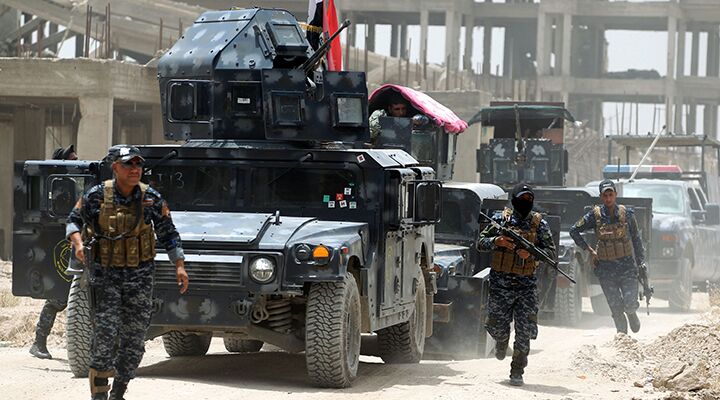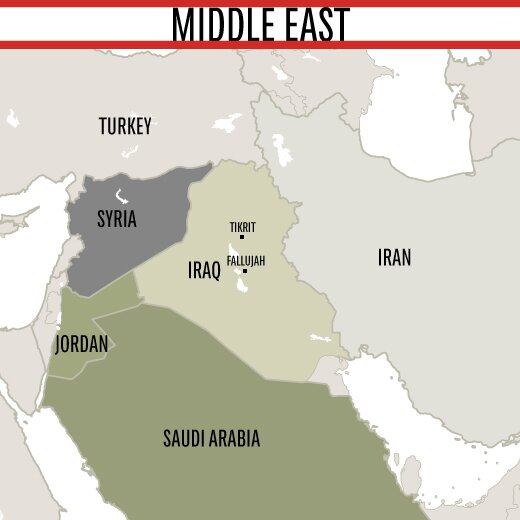
Retaking Fallujah
The operation to liberate the Iraqi city of Fallujah from Islamic State terrorists is well underway. Supported by United States’ airstrikes, Iraqi government forces have been making slow but steady inroads into the city. More than two weeks into the offensive, concerns are growing for the 50,000-plus residents still trapped in the city. Not only do the citizens of Fallujah have to fear their Islamic State captors but also the incoming liberators.
Government troops are not marching in alone—alongside them are Shiite militias.
Anyone watching the painstaking liberation of Iraq from the Islamic State’s clutches will know that the Iraqi government has only made gains with the aid of these militias.
Often backed and supported by Iran, the Shiite militias have made progress throughout the country—often in places where government troops have turned and fled. In many Shiite circles, the victories have elevated militia leaders like Qassem Suleimani to the status of savior. Some consider him to be the real leader of Iraq. But this view is not supported by Iraq’s Sunni populace, and with good reason.
Many Sunnis still bear the scars of their “liberation” from the Islamic State by Suleimani and his militias.
Tikrit is just one example. Situated on the banks of the Tigris River, Tikrit was captured by the Islamic State in June 2014. When control was finally wrested back from the Islamic State in early 2015, the Iraqi government was barely involved.
In fact, only 3,000 Iraqi security forces joined the battle. The small force was bolstered by 1,000 Sunni tribal militias. But the majority of the fighting force—some 20,000 troops—were Shiite militiamen from the Popular Mobilization Force, directed and funded by Iran.
Entering into a predominantly Sunni city, many of the Shiites were looking for payback—be it against the Islamic State or the Sunnis who watched as 1,000 of the city’s Shiite fighters were tortured and killed by the terrorists.
Many Shiites blame the Sunnis for inaction against, and even support of, the Islamic State incursion.

The city was liberated from the Islamic State, and the revenge began.
It wasn’t long before shops were burned. Militiamen spray-painted their group names on buildings and firebombed any establishments they believed were used by the Islamic State or its supporters. Iraqi officials said the Shiites were “out of control.”
Deep-seated hatred and mistrust between Shiites and Sunnis led to widespread attacks on the Sunni populace by the Shiite “liberators.” Many residents were kidnapped and tortured.
That was the liberation of Tikrit.
With that in mind, it is easy to see why many analysts and news watchers now fear for the residents of Fallujah.
According to the Telegraph, more than 300 Sunnis have already been executed by Shiite militiamen in the outer suburbs of Fallujah. As Telegraph’s chief foreign affairs columnist, Con Coughlin, wrote:
Rather than celebrating their liberation from the Islamic State, the remaining inhabitants of Fallujah now find themselves caught on the horns of an awful dilemma. Either they risk execution by Islamic State fighters as they try to escape, or they risk execution by Shia militiamen if they offer to surrender.
The well-known brutality of the Iranian-backed Shiite militias is now descending on the city of Fallujah and its remaining 50,000 residents. The government-sanctioned Popular Mobilization Force that tortured the residents of Tikrit and murdered civilians in mass revenge killings is now on Fallujah’s doorstep.
The truth is, the Iranian-backed Shiite militias are no less calloused and inhumane than their Islamic State rivals. The two share equally revolutionary goals for the nation of Iraq. Both are seeking to control the nation as part of an Islamic superstate—one wants it Sunni and one wants it Shiite. Both are willing to walk over civilian corpses to achieve it.
As U.S. Chairman of the Joint Chief of Staff Gen. Martin Dempsey said:
The activity of the Iranians and their support for the Iraqi security forces is a positive thing in military terms against [the Islamic State]—but we are all concerned about what happens after the drum stops beating.
The drums stopped beating in Tikrit when the Shiites wreaked chaos on the Sunni population. Today, the drum is beating in Fallujah.
Keep watching as Iran uses the Islamic State’s presence to hasten its own ascendency in Iraq. Cities like Fallujah are a part of a far broader strategy for Iran that will see the likes of the Tikrit offensive repeated on a broad scale. As Jerusalem Post columnist Caroline Glick wrote, “The name of the game today is chess. The entire Middle East is one great board. When a pawn moves in Gaza, it affects the queen in Tehran. And when a knight moves in Fallujah, it threatens the queen in Jerusalem.”
But as Bible prophecies in Daniel 11 and elsewhere indicate, Iran’s actions will affect the entire planet. When a knight moves in Fallujah, it threatens the world!
Be sure to listen to the Trumpet Daily Radio Show program “America and the Islamic State Are Both Concealing Iran’s Rise as King of the Middle East.” Only the Trumpet can give you the whole picture of why Iran is so active in Iraq, where it is leading, and how Iran’s involvement will soon affect you personally!
